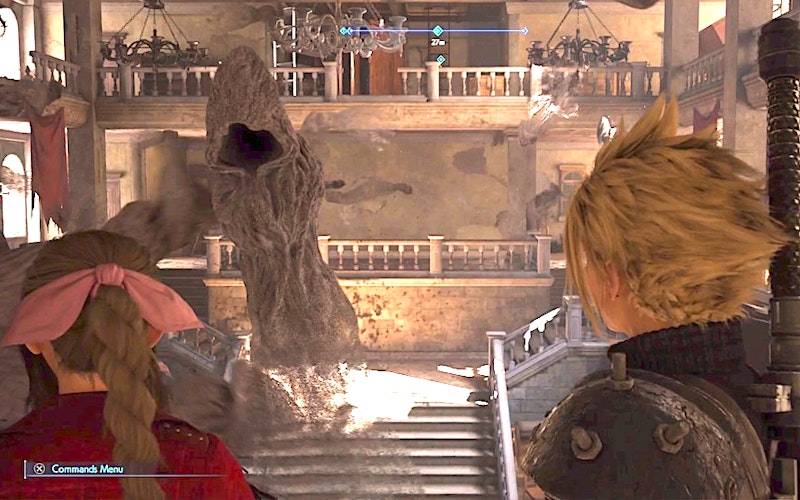
Games
Fighting Fate in Final Fantasy VII Remake
Since the 1997 release of the original Final Fantasy VII, many players have experienced the excitement of a certain spiky-haired mercenary’s first appearance. He leaps dramatically from atop a train and, as the cutscene ends and the game’s controls activate, Cloud Strife and his story become part of the player’s life.
The opening scenes of the much-anticipated Final Fantasy VII Remake lean hard on nostalgia, delivering stunningly high-quality recreations of original shots and musical cues. From Cloud’s grand entrance in the train station to a glimpse of the flower peddler, Aerith, the game triumphantly conveys that the creators have, once again, brought an incredible story to life.
Despite so much familiarity, the game soon reveals a strange new presence: ghost-like creatures in the shape of people in black, hooded cloaks, swirling through the air. In FFVII Remake’s Chapter 17, Red XIII—a furry, four-legged beast with human intelligence—finally reveals the identity of these creatures to Cloud and his companions: “Whispers. Perhaps best described as arbiters of fate. They are drawn to those who attempt to alter destiny’s course and ensure they do not.”
The Whispers are unique to Remake and serve as in-game manifestations of departures from the original game storyline. As the Whispers try to hold events on a predetermined course, the characters—and thereby, the player—often find themselves at odds with “fate” as the Whispers define it.
Confrontation with the Whispers recurs throughout FFVII Remake. At times, the characters are blocked or directed by the Whispers, such as when Cloud and Aerith must maneuver around them to exit the Sector 5 church. The Whispers also create more significant changes, even causing or preventing characters’ deaths.
Combat with the Whispers involves a distinct sense of futility. You can damage the creatures during certain scenes with both physical weapons and magical attacks, despite their apparently insubstantial form. However, as I played the game, I felt like I was “beating the air,” to quote the Apostle Paul, as I repeatedly directed Cloud to cleave the Whispers with the Buster Sword. Even though the Whispers’ health meters decrease, the creatures’ wraith-like forms—combined with their sheer numbers—leave you nagged by the sensation that your actions are doing little (if any) good. Worse still, you sense that the Whispers will reappear to cause more trouble later.
Combat with the Whispers involves a distinct sense of futility.
Striving is simply part of the human condition. From the honorable hard work required in our jobs, families, and studies to the traumatic struggles of illness, financial hardship, and relational conflict, there always seems to be another fight. Perhaps Cloud’s last name, Strife, is an allusion to this common struggle, subconsciously suggesting to players that their primary avatar in FFVII Remake understands how hard life can be.
As Christians, we are called to strive in certain situations by the victory and power of Christ. In reference to his ministry, Paul wrote that he worked hard, not with his own power, but “with all the energy Christ so powerfully works in me.” Using terms suited for a battlefield, Paul also exhorted his fellow Christians to be prepared to confront evil—for even more inevitable than Cloud’s struggle against Sephiroth, the game’s ultimate villain, is “our struggle [which] is not against flesh and blood, but against the rulers, against the authorities, against the powers of this dark world and against the spiritual forces of evil in the heavenly realms.”
Unlike the characters of FFVII Remake, however, we don’t have to fight against fate. Rather than a struggle to shape destiny, the Christian life is a road of working with God in obedience to accomplish his purposes—and this should comfort us. No matter what we encounter, our loving and sovereign God remains in control and empowers us for each challenge. Following God will certainly involve battles, but his calling is ultimately a call to surrender completely to him. We can rest from a struggle against “fate,” instead trusting our lives to the God who changed our destiny “from death to life” and who will complete his good work in us.
Whether it’s a Whisper getting directly in the characters’ way or a subtle sense that wrongs need to be righted, the storyline and gameplay of FFVII Remake urge the player to struggle against predetermined fate. In real life, however, we are not forced along an arbitrary path by uncaring “arbiters of fate” (a linguistic similarity that could hardly be a coincidence). Nor are we left to rely on our own judgment as we twist fate into our ideal. Instead, through both triumphs and challenges, we are led and carried by God—and we already know our path’s ultimate destination: home.
Topics: Games